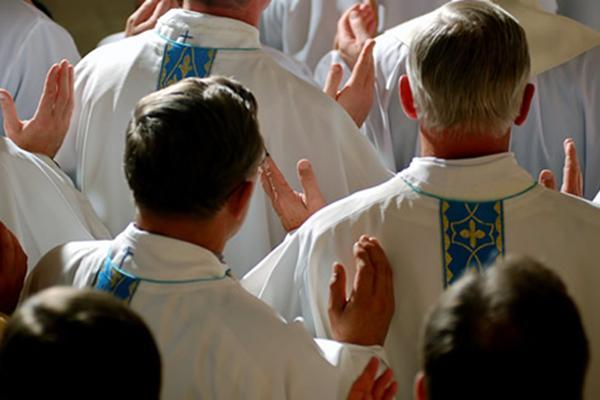
Jim emailed: Dear Father, I cannot answer a challenge I encountered regarding the original (or "Vilnius") Divine Mercy Image. In just about every other image of our Lord that depicts His glorified body, His holy wounds are present and visible. Perhaps I am not looking closely enough, but I cannot see the wounds on any of the Vilnius images that I have found (except, perhaps, in old photographs of the image before it was restored). Do you know how one is to account for this (at least apparent) lack of Christ's wounds?
Please know that I intend no disrespect to the Vilnius image, specifically, or to the Divine Mercy devotion, in general; my question is made in full earnestness. Whatever wisdom you can find the time to impart is very much appreciated.
Jim, that is an important question. The wounds are unfortunately not very visible on the restored Vilnius image due to the kind of paint that has been used. I know that, digitally, some of the employees at the Marian Helpers Center in Stockbridge, Massachusetts, have attempted to make the wounds more visible. Part of the difficulty is the direction of His hands. Also, His tunic covers the wounds of His feet. But the simplest answer is to keep in mind that the entire image focuses upon the wound of His pierced Heart. The entire image hinges upon the wound that pierced His side and His Heart, out of which Blood and Water flowed, which is the center of the image. That wound - the most important in some ways - according to St. Catherine of Siena, symbolizes the infinite love of God poured out upon us in Jesus' death and Resurrection.
Nancy asked: Dear Father, in the June Friends of Mercy newsletter, you said all sins confessed "are forever dissolved in His mercy," which I have always struggled believing. I think that if I believed that Christ truly "forgot" our confessed sins, I, too, would be a more forgiving person, and I would also have a greater chance of being holy because I would not be so full of fear, shame, guilt, and dread of the judgments. However, I remember Christ saying in the Bible how we will be accountable for every word we speak. That doesn't sound like He is forgetting anything! Also, I thought the general judgment (as opposed to the particular judgment) was all about revealing everyone's sins to the world partly so that we could see that some "bad" people weren't so bad, and some "good" people weren't so good after all. So, it sounds like He is remembering and revealing every one's sins.
I don't mean to be disrespectful. I just truly don't understand how Christ "forgets," considering that we are accountable for our speech, and that we have two judgments, both of which seem terrifying and quite frankly, humiliating. Thank you, if you can straighten me out.
Nancy, you have asked an excellent question!
There are stories of Jesus forgetting sins after they are confessed (e.g., Jesus' words to St. Margaret Mary Alacoque about her confessor, St. Claude de la Colombiere). However, strictly speaking, Jesus cannot forget anything. He knows all things and cannot simply will to forget something. The question is not whether He remembers; the question is how He remembers. For He also remembers our repentance, our sorrow, our penance for sins. So, the Catechism (1470) states that we anticipate our judgment every time we go to Confession, because we freely go before the Judge to tell Him now what our sins are. When we freely admit our sins in the Sacrament on earth, we are forgiven and receive mercy. If we do not admit our sins now, He will reveal them to us at judgment.
When Jesus states that we are accountable for every idle word (Mt 12:36), He is issuing a general warning. He is not stating that He will, in fact, mention everything we have ever misspoken, even if we have confessed it. Rather, He is providing a general teaching: We ought to be careful how we use our tongues, for we will be held responsible for them on the day of judgment. But we can anticipate that judgment through Confession, and hence our sins are forgiven and not brought up at judgment.
Your question about the final judgment is also important. Its purpose is not primarily negative but rather positive. There are so many unanswered questions: Why did this person suffer? Why did God allow so much evil? He will explain His divine wisdom - as much as we can understand it. Yes, there will be a revealing of sin, but not to shame us; rather, the purpose is to show how even our sin became part of His plan of salvation, just as the sin of crucifying Jesus led to our redemption. In the light of His mercy, the mystic Julian of Norwich notes, our sins will no longer cause shame but joy, for we will see how they are but signs of the omnipotence of His mercy that has led us out of sin to His glorious light. Saint Edith Stein speaks of the same: Our wounds of weakness and sin are transformed by the Holy Spirit to become wounds of love, where His mercy can enter in.
Do you have questions for the Marians? Email us at FriendsOfMercy@marian.org or write to Friends of Mercy, Marian Helpers Center, Stockbridge, MA 01263.

















